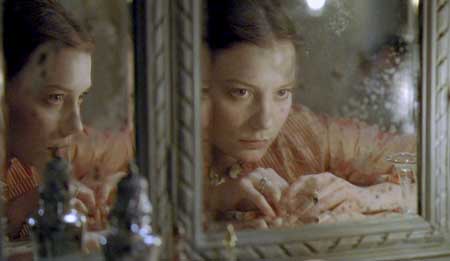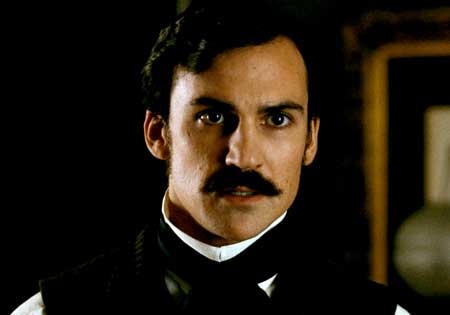Film (2014)
Directed by Sophie Barthes
Screenplay by Sophie Barthes and Felipe Marino
Based on the novel Madame Bovary (1856)
by Gustave Flaubert
Music by Evgueni Galperine, Sacha Galperine; Cinematography by Andrij Parekh; Film Editing by Mikkel E.G. Nielsen
Production Design by Benoît Barouh; Costume Design by Christian Gasc, Valérie Ranchoux
West Newton Cinema, Newton, MA
With Mia Wasikowska (Emma Bovary), Henry Lloyd-Hughes (Charles Bovary), Rhys Ifans (Monsieur Lheureux), Ezra Miller (Leon Dupuis), Paul Giamatti (Monsieur Homais), Logan Marshall-Green (The Marquis), Laura Carmichael (Henriette),

in “Madame Bovary”
Image: Courtesy of Occupant Entertainment
Poor Emma Bovary (Mia Wasikowska), who never seems content at all, even from the outset, with her marriage to Charles Bovary, a decent, responsible, dutiful country doctor. In this new retelling, Charles is not a bad looking guy, quite charming in his own way, posing an endless question about why Emma is so displeased with her marriage. (In the novel, Charles is a far less desirable stick-in-the-mud than he is here.) Emma takes leave of her convent school to marry him (also somewhat different from the novel), so the sense of escape and bondage to her marriage is in evidence from the start. But nothing the poor man can do is right and Emma satisfies all of her dissatisfaction by buying endless goodies for the house, elegant clothes and what-not, which serves, in the end, to plow under the couple’s modest fortunes. (There is no sign of childbearing in the film, though there is in the novel). Meanwhile, Emma entertains herself with two extramarital affairs, one with a Marquis (Logan Marshall-Green) and one with a young lawyer, Leon Dupuis (Ezra Miller), neither of which serves to release her from her self-perceived state of bondage.
Mia Wasikowska, widely recognized as one of the most talented actresses of her generation, is generally a great pleasure to watch. Her appearance on the scene in The Kids Are All Right (2010) and Alice In Wonderland 2010) and then her deserved and well-received appearance in Jane Eyre (2011) cemented the foundation of her reputation. In the small but great film based on the Dostoevsky novella, The Double(2013), she paired beautifully with Jesse Eisenberg to produce a delightful small triumph as well.
Here, however, we do not get her best performance. It seems as though she is struggling in almost every scene to convey something, but seems oddly constrained. The result is that many of her lines seem wooden. I suspect there’s something weird in the direction of the film, urging the application of a stilted form of delivery, meant to convey a sense of the classic, onto a base of American English. It just doesn’t work. A number of actors in the film exhibit this unfortunate strategy of declamation, so I guess the direction is responsible. The greatest toll of this approach applies to Wasikowska.
The result is that, instead of getting a deep sense of a brooding, difficult woman who, through the combination of dissatisfaction, desire, manipulativeness, ambition and self-absorption, destroys the life she and her husband have established, we get a more superficial impression; halting speech cum grimaces, indicating dissatisfaction, prevail, followed by random outbursts that don’t make a lot of dramatic sense.
Flaubert’s novelistic treatment is valuable for its depiction of a psychologically complex, female character bound to a certain position in the social realm who tragically sinks her own ship. Though we get that overall narrative in this film, the psychological portrait which supports it is largely absent.

in “Madame Bovary”
Image: Courtesy of Occupant Entertainment
There are some wonderful and surprising casting choices here that work remarkably well. The most successful of these is Rhys Ifans as the merchant-creditor Monsieur Lheureux. He is best known for playing the totally offbeat roommate in Notting Hill (1999) with incredible wacky verve, but here he is diabolical in an insinuatingly effective way, a very interesting rerouting of that capacity for wackiness.
As well, Laura Carmichael (Henriette), known to PBS audiences far and wide as Edith in Downtown Abbey, offers a lovely, though not highly verbal performance, here as the Bovarys’ maid. With a few well articulated facial gestures she communicates volumes.
And Henry Lloyd-Hughes, who plays Charles, does not have a great deal to do dramatically, but offers a clear and appealing performance as the country doctor and cuckolded husband, even though his modest charm and good looks are not quite right for the part.
Paul Giamatti, who is in the running with Bradley Cooper for most omnipresent film actor, weighs in as Monsieur Homais, with a capable but not notable performance. Giamatti is also now featured in a film currently in theaters in a totally different role, as a wacky therapist in Love and Mercy (2015), about Brian Wilson of The Beach Boys. (I’m somewhat surprised that Bradley Cooper didn’t make it into Madame Bovary; he seems to be everywhere else.)
Ezra Miller (Leon Dupuis) and Logan Marshall-Green (The Marquis) are serviceable as the pretty boys on hand for Emma.
This production is nicely designed in many ways, its costumes by Christian Gasc, Valérie Ranchoux particularly appealing.
The score by Evgueni Galperine and Sacha Galperine is inventive but somewhat intrusive, always announcing itself, creating a very general, airy, and tonally offbeat mood rather than specifically supporting the emotional tenor of particular scenes.
The Lowdown: If you’re a Wasikowska fan, see it, by all means, but prepare for not her best performance. If you’re a Flaubert fan, see it to collect another one of the film versions, with a nicer and better-looking Charles than might be expected. (There are earlier versions directed by Jean Renoir (1934), Vincente Minnelli (1949) and Claude Chabrol (1991), among others.) If, however, you’re going out on the town and want to see a period piece, I’d recommend the current adaptation of Thomas Hardy’s novel, Far From The Madding Crowd which offers better performances overall.
– BADMan
Leave a Reply